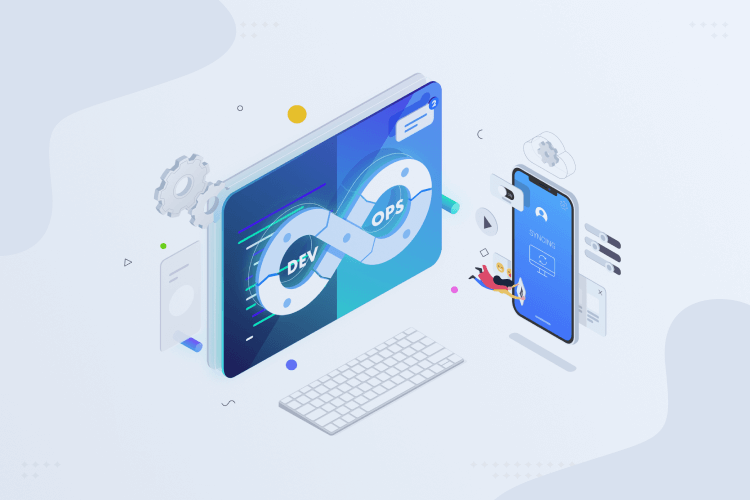In the last ten years, the creation of mobile apps has advanced significantly, and this trend is growing. Since there are millions of apps accessible in app stores, it’s getting more and harder for developers to stand out. Developers must be able to produce high-quality apps that are deployed promptly, consistently, and efficiently if they want to win in this fiercely competitive industry. DevOps can help in this situation.
Software development and IT operations are combined in the DevOps methodology to enable the quick and ongoing supply of high-quality software. Coordination, communication, and automation are the three pillars of DevOps, which may assist mobile app developers in streamlining their operations, enhancing quality, and speeding up time to market.
In this post, we’ll examine the advantages of DevOps for creating mobile apps and offer some advice for implementing DevOps in your own app development initiatives.
Benefits of DevOps for Mobile App Development
Faster Time To Market
DevOps’ ability to reduce mobile app development cycles is a major advantage. DevOps allows developers to speed up the release of new app features and updates to consumers by automating a large portion of the development process. This is especially important in the modern digital era, as consumers have come to demand constant updates and enhancements to their favorite programs.
Quality Enhancement
DevOps also has the potential to enhance the quality of mobile applications. Bugs and other issues may be found and fixed earlier in the development cycle with the aid of DevOps’ automated testing and quality assurance methods, saving both time and money. The stability and dependability of mobile apps are essential to user pleasure, and both may be enhanced with the aid of DevOps.
Improved Productivity
DevOps may also be used to improve the productivity of mobile app creation. Developers may spend more time writing code and less time on administrative work when app development processes like code compilation and deployment are automated. This has the potential to shorten the development cycle, boost productivity, and minimize mistakes.
Getting Started with DevOps in Mobile App Development
If you’re interested in using DevOps in your own mobile app development projects, here are some tips to help you get started:
-
Start Small
If you’re new to DevOps, it’s best to start small and focus on a few key areas that can have the most significant impact on your development process. For example, you might start by automating your build and deployment processes or implementing the automated testing.
-
Build a Strong DevOps Team
DevOps is all about collaboration and communication, so it’s essential to build a strong team that includes developers, operations personnel, and other stakeholders. This team should work together to identify areas for improvement, develop strategies for implementing DevOps practices, and continuously monitor and improve the development process.
-
Embrace Automation
Automation is a core principle of DevOps, and it’s essential for streamlining and accelerating mobile app development. Look for opportunities to automate repetitive tasks, such as building and deploying code, testing, and monitoring.
-
Use the Right Tools
To succeed with DevOps in mobile app development, it’s crucial to use the right tools. There are many DevOps tools available, such as Jenkins, GitLab, and CircleCI, that can help you automate your development processes, manage code repositories, and monitor your app’s performance.
-
Continuous Integration and Deployment
Continuous Integration and Deployment (CI/CD) is a core practice of DevOps that involves the automation of code integration, testing, and deployment. CI/CD can help mobile app developers to identify and fix bugs quickly, reduce development time, and improve collaboration among development and operations teams. By using CI/CD, mobile app developers can deliver new features and updates to users more quickly and with greater reliability.
-
Infrastructure as Code
Infrastructure as Code (IaC) is a practice that involves automating the deployment and management of infrastructure using code. This means that developers can manage infrastructure, such as servers and databases, in the same way they manage code. IaC can help mobile app developers to improve the scalability and reliability of their infrastructure, reduce manual errors, and improve collaboration among teams.
-
Monitoring and Analytics
Monitoring and analytics are critical aspects of DevOps for mobile app development. By monitoring the performance of mobile apps and analyzing user behavior, mobile app developers can identify areas for improvement and make data-driven decisions. DevOps practices can help mobile app developers to implement monitoring and analytics tools, automate the collection and analysis of data, and continuously improve the user experience.
-
Security
Security is a critical concern for mobile app development, and DevOps can help mobile app developers to ensure the security of their apps. By integrating security into the development process, mobile app developers can identify and fix vulnerabilities early in the development cycle, reduce the risk of data breaches, and improve the overall security of their apps.
Summing it Up
In conclusion, DevOps is a powerful approach to modernizing mobile app development. By combining development and operations practices, DevOps can help mobile app developers to deliver high-quality apps faster and more efficiently. By embracing DevOps practices such as automation, continuous integration and deployment, infrastructure as code, monitoring and analytics, and security, mobile app developers can stay ahead of the competition in the fast-paced world of mobile app development.
If you’re not already using DevOps in your mobile app development projects, now is the time to get started. By following the tips outlined in this article and embracing DevOps practices, you can streamline your development process, improve quality, and accelerate time-to-market. With the right tools, a strong team, and a commitment to continuous improvement, you can take your mobile app development to the next level with DevOps.

